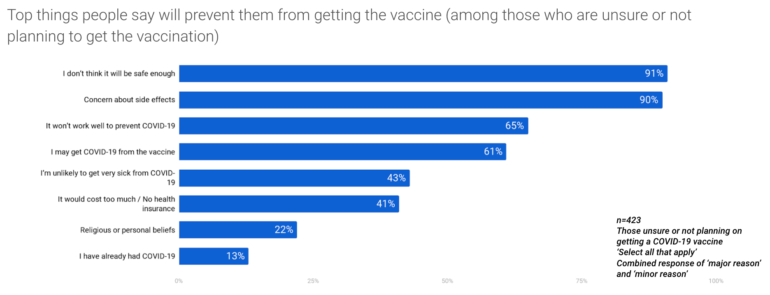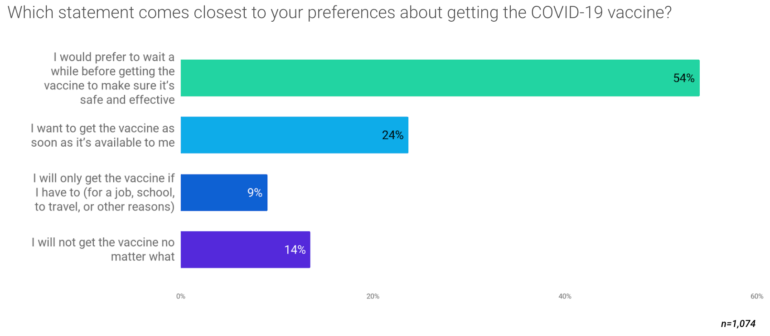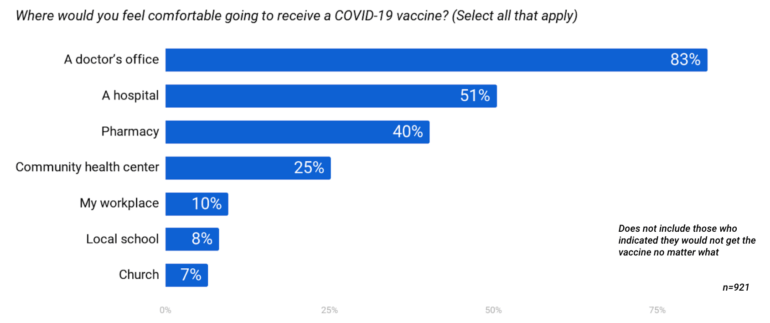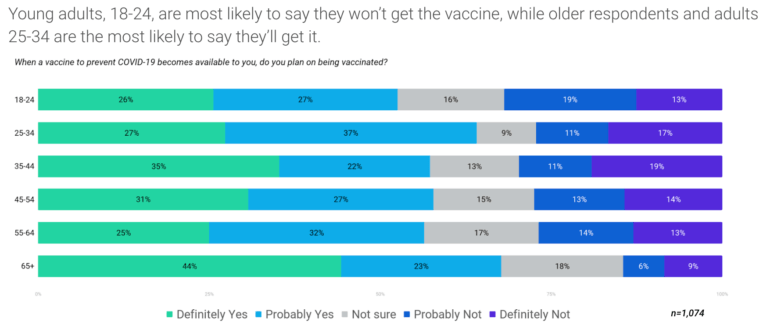Customer Experience
How ready are Americans to trust a COVID-19 vaccine?
After months of quarantine and a barrage of changing information, much of the American public has been left feeling confused and concerned about the effects, safety, and timeline of a COVID-19 vaccine.
A new Qualtrics study asked over 1,000 adults in the United States how they felt about a vaccine and found broad skepticism — though certain factors could increase people’s trust in a vaccine’s potential.
A lot of people are still wary of a COVID-19 vaccine
Forty percent of Americans either don’t plan on being vaccinated or are unsure of what they will do when a vaccine for the COVID-19 virus becomes available, the study found. Nearly all respondents in that group said they’re hesitant because of safety concerns and possible side effects, while a majority said they’re also worried a vaccine won’t work well enough to protect against the virus or they may get COVID-19 from the vaccine.

Nearly half of all respondents believe it’s likely that those vaccinated will experience serious side effects, while more than half of all respondents (51%) believe it’s likely that a vaccine will be released in the U.S. before it’s been fully tested for effectiveness and safety.
However, 46% don’t believe a vaccine will be available to people in the U.S. within the next six months. And Americans are especially worried about receiving a vaccine that was developed in a foreign country, most notably, China, Russia, or India.
These concerns will also likely affect how soon the American public decides to be vaccinated once the opportunity is available. The majority (54%) of Americans said they would prefer to wait a while before being vaccinated to make sure it’s safe and effective. About a quarter said they want the vaccine as soon as it’s available, and nearly 10% said they will only get the vaccine if it’s required for things like work or school. A full 14% said they won’t get the vaccine no matter what.

What could ease people’s worries about the vaccine?
While many are still skeptical about a vaccine and its effects, there’s a much greater chance Americans will be vaccinated if local, state, and national health officials recommend it, the study shows. Others said they would feel more comfortable if they knew their state government had the proper system to deliver the vaccine (although only 59% believe their state government currently does).
Americans, however, report a high level of trust in their doctor: 81% said they would be more likely to get the vaccine if their physician recommended they do so. And nearly 85% said they would feel comfortable being vaccinated for COVID-19 in their doctor’s office, while just over half (51%) said the same about a hospital.

And though many seem hesitant to actually get the vaccine, at least 45% believe it could greatly or completely reduce the risk of getting COVID-19. Another third of respondents believe it could moderately reduce the risk of getting the virus.
The lure of normal life is also likely to draw in some of those on the fence: 70% said their decision to be vaccinated would be affected if the vaccine were required to visit a hospital or nursing home. A nearly equal amount said they felt the same if the vaccine were required to travel to another state or fly on an airplane.
Only about 60% said their decision would be affected if the vaccine were required for work or large gatherings — and 51% said the same about attending school.
Who is the most — and least — likely to be vaccinated?
Young adults aged 18-24 are the least likely to get the vaccine (53% said they’ll do so), while seniors 65+ are the most likely (67% said they’ll be vaccinated). But it’s not a completely neat division by age. Young adults aged 25-34 are the second most-likely to get the vaccine, with 64% that said they’ll do so.

News sources may also correlate to people’s likelihood of receiving the vaccine. Those who get their news often from print newspapers are the most likely to say they’ll be vaccinated: 73% said they will. Those who get their news often from social media, on the other hand, are the least likely, with only 59% saying they will get vaccinated.
For more information on this study, download the full report.
Make data-driven decisions about public health in your community with our Vaccine Management + Citizen Experience solution
